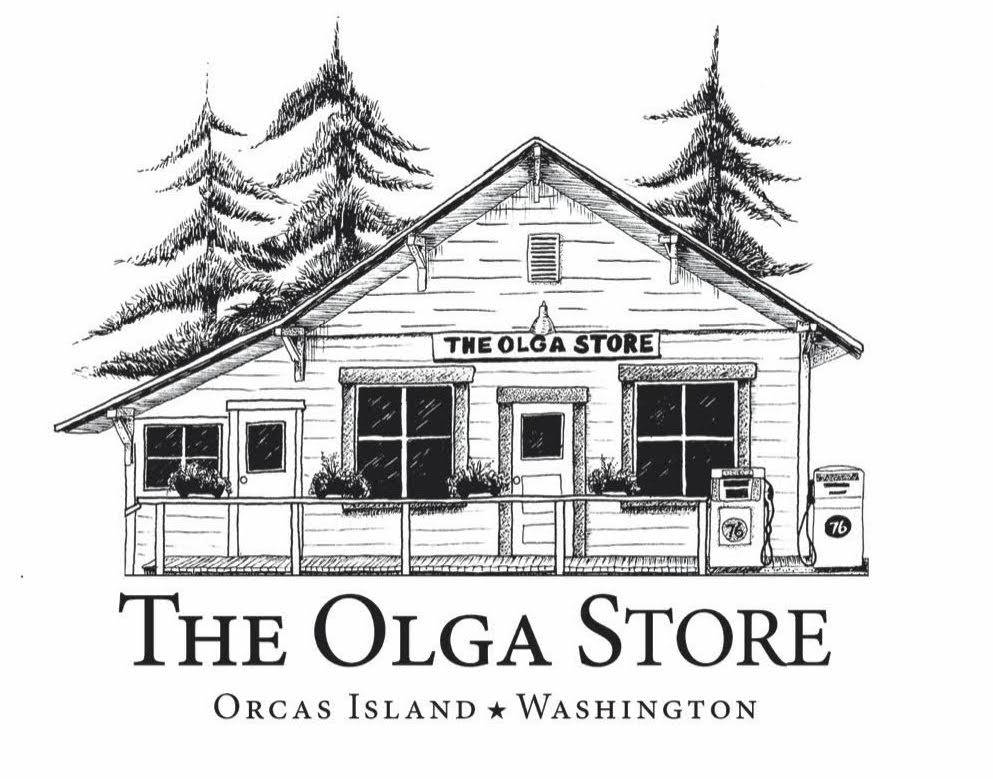For the first time in a decade, the 100-year-old, Orcas Island milled, cedar flooring inside the Olga Store will come alive beneath the footsteps of the public.
As of Jan. 21, the beloved, eastside historic landmark is community owned and operated.
In 10 months, what started out as an idea ballooned into a small community’s dream and swiftly became reality, made possible by hundreds of grassroots donations totaling over $675,000. The nonprofit Friends of the Olga Store Board have preserved an iconic structure that speaks of values and times that are dear to Olga residents, President Colleen Stewart shared.
“We sprang into action, reached out to our neighbors and fundraised. Despite a lot of doubters, we did it. Huge hats off to the community,” FOSB Secretary Selby Lighthill echoed. “One donor on the eastside approached us to make a donation, but wanted to make sure the project was legitimate and sound because if they didn’t give the money to us, they were going to use it to replace their fence. This is real money, it didn’t come from fat cats who have cash to burn. This was made possible by people who were willing to forgo things in their own life to preserve this special charm of the island.”
Stewart and Lighthill, alongside fellow FOSB Board members Gay Peresky, Debbie Durand, Oshen Schiweck, Bizzy Riley, Frank Martin and fundraiser Chelsea Thorpe say while their laser focus thus far has been on purchasing the building, their mission going forward remains unchanged. The objectives of FOSB are threefold: incorporate United States Postal Services back into its historic context of a multi-purpose store; establish space to lease to the Orcas Food Co-Op Café; and activate the building as a public hub. The board also continues to advance historical designation applications. Since the Olga Store building is currently designated as a Commercial Use space, proposed renovations to leased space for the U.S. Postal Service will not require a Change of Use permit.
There are, however, other challenges present when attempting to negotiate the needs of the USPS, food co-op and Land Bank, FOSB says.
Because the U.S. Postal Service is a federal agency, they are able to “make their own rules when it comes to permitting,” Lighthill shared.
The U.S. Postal Service has indicated concerns with the building’s energy efficiency, expressing interest in installing double pane windows. The historical society would prefer to keep the windows as-is. Similarly, Lighthill says, FOSB believes it is important to maintain the original flooring, even if the U.S. Postal Service would prefer something newer or more durable. Historic preservation money would put restrictions on what FOSB can and cannot do to the building in order to preserve its historic integrity.
“It’ll kind of give us leverage with new tenants about what we are required to keep as is. All the negotiations are a delicate compromise right now. It’s really meticulous, but things are ultimately going in a really smooth direction,” Stewart said.
Additionally, the Orcas Food Co-Op will no longer be outfitted in the building’s south facing sun porch. Instead, groceries, pre-made deli foods and drinks will be sold out of the renovated rear apartment. The corridor in the south facing sun porch will be managed by FOSB as a sitting space with a view.
“I think what’s been the hardest for everybody was the stress of not knowing whether or not the purchase would happen. Even though there’s a lot of work ahead, I personally feel super excited about it,” said Learner Limbach, Orcas Food Co-Op’s general manager, who said his team is working to draw up a new rendering of the updated proposed floor plan.
Already this year, FOSB replaced the roof with a generous donation that covered a third of the cost. It has entered into “Phase 3” of its fundraising efforts, creatively leveraging the expertise of neighbors to facilitate renovations and looking to the Olga Artworks Building and Strawberry Council as models for public ownership of public space.
The Artworks, founded in 1981 to showcase the thriving art and fine craft scene on Orcas Island, is also a nonprofit cooperative structured so that the maximum proceeds from sales go to its members.
In April 2015, years after the historic Olga Strawberry Barreling Plant burned down in suspected arson, the community worked together to purchase and restore the property and reopen under the direction of a local council.
“The idea is: instead of having a profit-driven landlord, we can work as a nonprofit building owner to keep rents affordable for community businesses or organizations that otherwise would be priced out and lose their important space,” Lighthill said. “The food Co-Op building has also been a model for us. Really beautiful island craftspeople and carpenters donated their energy to make that building happen. It took a community for us to buy and it will take a community for us to build.”
Seattle architect Ben Trogdon, who was the architect for the Olga Artworks rebuild, was chosen to design the Olga Store restoration. His challenge will again be to preserve the historic elements and appearance of the building while bringing it up to current codes.
“Now that we own the building we have a responsibility to be good stewards. I have a one-and-a-half-year-old daughter. I want her to grow up and work in the store when she’s in high school. We have to make sure we can be sustainable for the community, environment and donors,” said Lighthill.




